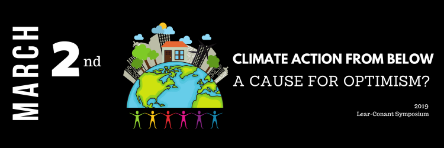Cities on the World Stage: Between Promise, Possibility and Peril
Emerging from the shadows of underwhelming state-led efforts to develop a meaningful response to the challenge of climate change, cities have stepped onto the world stage and established themselves as sources of hope and optimism. Mobilized by a potent combination of imperatives, incentives, and ideals, cities have come to claim the role of global leadership, most clearly illustrated in the coordinated efforts of networks like the C40 Climate Leadership Group, ICLEI, and the Global Covenant of Mayors. Collectively, cities offer the enticing possibility of sidestepping political barriers, disrupting the status quo, and opening up the possibility of carbon neutrality and climate resilience. At the same time, the path from promise to performance is full of peril and cities will need to navigate a difficult course between global expectations and local demands. In this talk I set out what cities have accomplished thus far, how they’ve managed to do so, and what challenges they will need to confront if they are to fulfill their promise as global climate governors.
David Gordon
Assistant Professor of Politics, University of California Santa Cruz
Can We Get There From Here?
Climate Governance Experiments, Decarbonization, and Justice
The challenge humanity faces is clear. We need to imagine and work toward low carbon societies very quickly. Thus far, the traditional means for pursuing large scale social and economic change—national lawmaking and international treaty-making—have largely failed or are moving too slowly. Fortunately, a wide array of climate initiatives has emerged into this vacuum, including experimental action by cities and states/provinces, corporations, and civil society. While this experimentation provides hope that humanity can generate the necessary momentum to catalyze decarbonization, the ultimate effectiveness of it remains an open question. In this presentation I will discuss the opportunities and challenges that climate governance experiments provide for catalyzing decarbonization on a broad scale and I will highlight the role that social justice and equity concerns can and must play in these experiments if they are to contribute to achieving a low carbon future.
Matthew Hoffman
Professor of Political Science, University of Toronto
Hope and Activism
Is hope for improved responsible action regarding climate change merited by climate change activism? Prior to answering this question, I propose a working concept of hope. My account is based on an approach derived from positive psychology in which, rather than looking for understanding of hopefulness through studying those who are lacking it, one explores patterns to be found among hopeful persons. The concept of hope I advance distinguishes hope from optimism and roots hope in world-mapping justified belief in the possibility of achieving the hoped-for goal. Thus, hope for improved responsible action regarding climate change is merited only if the articulated goal is, on a reasonable analysis, achievable. I will complicate the account by introducing the theory-action gap, which highlights how notoriously bad humans are at having their actions align with their rational beliefs. This presents a conundrum in that even if humans accept that climate change is one of the largest threats to life on Earth, it does not mean they will act in ways that reflect this belief. Despite such challenges I argue that it is reasonable to have hope regarding improved responsible action relative to climate change because a) such a view is justified by the variety and intensity of climate change activism occurring the world over and b) the fact that the activism exists provides direct evidence of theory-action bridging regarding climate change action. Paralleling the approach positive psychology recommends, we can gain understanding about how to build capacity by taking our cue from effective and resilient activists.
Lisa Kretz
Associate Professor of Philosophy, University of Evansville
The American Carbon Pricing Odyssey: Past, Present, and Future
Carbon pricing in the form of either cap-and-trade or carbon taxation has been on the political agenda in Washington, DC and many states for nearly two decades. But this climate policy option that is widely endorsed by ideologically diverse economists has struggled in the political arena, reflected in rejection of numerous proposals and reversals in 13 of 23 states that adopted cap-and-trade between 2004 and 2008. However, there remain important carbon pricing cases operational at the state and regional levels and it is possible to envision new movement on carbon pricing during state legislative sessions during 2019-2020 and beyond. Rabe's talk will review the past history of carbon pricing in the U.S. and internationally and explore why it has proven so politically challenging. It will also highlight lessons from more successful and enduring cases, as well as identify leading cases whereby carbon pricing might become politically feasible in the near term. This discussion will expand beyond traditional forms of carbon pricing to examine production taxes on the extraction of fossil fuels and their possible extension to address methane flaring in various states.
Barry Rabe
Professor of Public Policy and Director of the Center for Local State and Urban Policy (CLOSUP) University of Michigan Gerald R. Ford School of Public Policy
This event is FREE and open to all, but registration is required. Your event registration includes all lectures, a continental breakfast, breaks throughout the day, lunch and an evening reception with our speakers.
For additional event details, visit us at our Facebook Event Page.
